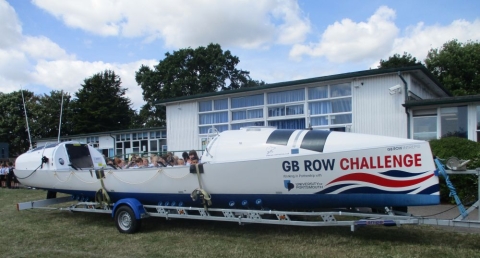Pupils from Horndean Junior School spent an afternoon learning about how a non-stop rowing challenge can be used to collect vital scientific data.
Scientist Dr Fay Couceiro from the University of Portsmouth talked to pupils about the GB Row Challenge, a 2,000 mile journey around Great Britain, which aims to shed light on ocean pollution.
The children learnt that one bin lorry of plastic is dumped in the world's oceans every one minute. They listened to the sound of shrimp and dolphins recorded during last year's challenge. And they discovered that noise pollution is an especially big problem for marine animals like whales who use sound to communicate with each other.
The eight and nine-year-olds also got to look at a 10-metre Rossiter ocean rowing boat named 'Intrepid', which is fitted with specialist equipment to gather data on microplastics, environmental DNA (eDNA), temperature, noise pollution and salinity.

Ocean rowing boat 'Intrepid' at Horndean Junior School
Dr Couceiro said: "Nine out of every 10 marine species in the whole world live on the coast, very close to land, which is why it's really important to gather data and keep our coastal waters healthy. Most of the interesting species are right on our doorstep!
"We hope that by sharing this exciting pairing of sport and science, the children will be inspired to think about the impact of human activities on the environment and what their role might be in future to contribute to a cleaner, healthier planet.
"We're grateful to the students, teachers, and staff at the school for their warm welcome and enthusiasm for this pioneering project."
Dr Couceiro talked about the rowing team of six women who are currently circumnavigating Great Britain. They set off from Tower Bridge, London, on Sunday 4 June and have spent XX days at sea. The data they collect will be analysed by Dr Couceiro and scientists at the University of Portsmouth.
The team has battled strong winds, torrential rain and complex tidal streams to collect data, but skipper, Emma Wolstenholme, managed to send a special video message to the children and showed them how they collect microplastics from the boat.
We hope that by sharing this exciting pairing of sport and science, the children will be inspired to think about the impact of human activities on the environment and what their role might be in future to contribute to a cleaner, healthier planet.
Dr Fay Couceiro, Reader in Biogeochemistry and Environmental Pollution
Dr Couceiro added: "One of the most significant outcomes of this research will be the development of a comprehensive map showing the distribution of ocean pollution around the UK. The project is spanning four years, so each year we can identify trends and track changes in environmental data over time.
"This map is the first of its kind and will serve as a powerful visual representation of environmental challenges, which we hope will drive informed decision-making for a more sustainable future."
If the female rowing team finishes the challenge within 50 days, they'll break a Guinness World record for the fastest female team and first female team of six to have ever completed the row.
GB Row Challenge Founder, William de Laszlo, said: "By involving the younger generation, we not only educate them about the environmental impact of human actions but also empower them to become catalysts for change. Through this initiative, we aim to inspire a sense of responsibility, instil a passion for science, and foster a deep appreciation for our planet's delicate ecosystems."






